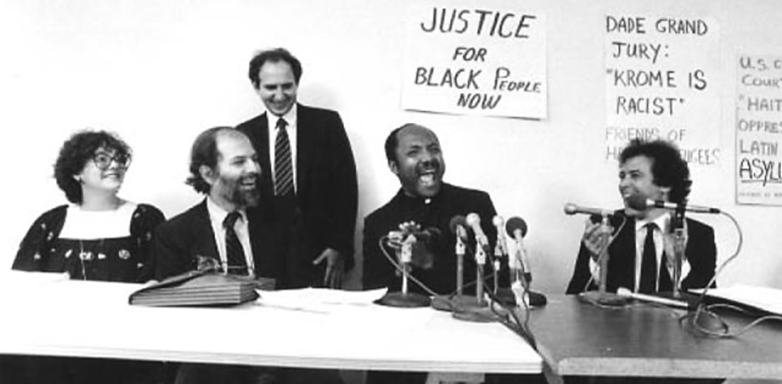 "Reverend Gerard Jean-Juste and the Haitian Refugee Center in Miami" by Alex Stepick, Ph.D.
"Reverend Gerard Jean-Juste and the Haitian Refugee Center in Miami" by Alex Stepick, Ph.D.
Stepick is Professor of Sociology at Portland State University. He has written and edited numerous books about the Haitian community in the United States and immigration, such as Pride against Prejudice: Haitians in the United States (1998), This Land is Our Land: Power and Interethnic Relations in Miami (2003), and Immigrant Faiths: Transforming Religious Life in America (2205).
The Haitian Refugee Center (HRC) began in the mid 1970s offering legal assistance to refugees, hosting Saturday night meetings to brief refugees on legal developments, and occasionally organizing local demonstrations. At the end of 1975 it received a significant boost when the National Council of Churches established Haitian Refugee Concerns. Its original intent was explicitly political, to organize Haitian migrants and community support groups. The two soon merged and by the middle of 1978 a solely Haitian-led group, Combit Liberté (rechristened Veye-yo, watch them, in the wake of Duvalier’s 1986 demise) emerged and became the primary political voice of Miami’s Haitian refugees.
Reverend Gerard Jean-Juste was the executive director of the Haitian Refugee Center and the leader of Combite Liberte from the time he arrived in Miami from Boston in 1977 until 1990 when he left Miami for Haiti where he soon became a part of the then newly elected Haitian government of President Jean-Bertrand Aristide. Jean-Juste originally left Haiti as a young man and attended seminary in Puerto Rico. In 1971, an exiled Haitian bishop in New York ordained him after which he taught English to Haitians in Boston. Upon arriving in Miami, he criticized the local archbishop for his inactivity on behalf of Haitian refugees. The local Catholic hierarchy soon ostracized him, barring him from giving mass locally. Throughout his time in Miami, he relished his role as a constant reminder to the local establishment’s conscience concerning Haitians and he was the most frequently quoted Haitian spokesman. His vocal opposition to the status quo eventually resulted in the organization losing its support from the National Council of Churches. The Ford Foundation stepped into the breach for fifteen years.
While Jean-Juste’s and the HRC’s political activities were highly visible, the legal services rendered by HRC were more critical to the formation of Miami’s Haitian community. The majority of work has been the representation of Haitians in asylum hearings and was done primarily by non-Haitian lawyers and Haitian legal aides. The most significant work was class-action suits on behalf of Haitian asylum claims. The legal victories frustrated the U.S. government efforts to repress the flow of Haitians to South Florida. Without those legal victories, it is likely that the U.S. government would have succeeded in its efforts and a critical nucleus of Miami’s Haitian community never would have formed.
Through the 1980s and 1990s, the HRC was the physical focus of political activity in Little Haiti. When the dictator Jean-Claude Duvalier left Haiti in 1986, Haitians celebrated on the street in front of the HRC. When the military assumed control through repeated coups, each time demonstrations filled the same street. When the former priest, Jean-Bertrand Aristide, campaigned for the presidency by visiting Miami, HRC organized massive marches in support of democracy. Whenever the national or local media wanted a quote concerning either Haitian refugees or politics in Haiti, they first went to the HRC.
Finally, after Aristide was restored as president in 1994 and the number of refugees plummeted, HRC lost its focus and intensity. The media called less often and Haitians themselves lost their solidarity in opposition to the military dictators. Within a couple of years, the Ford Foundation pulled its funding from HRC, bills were left unpaid, staff reduced, and reaming workers wondered when the end would come.
